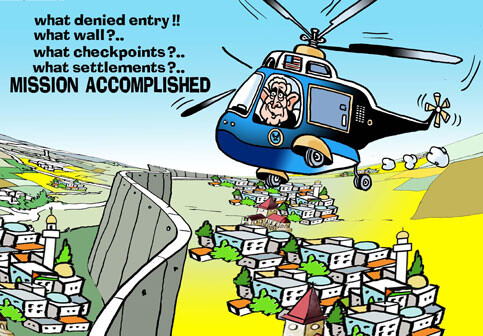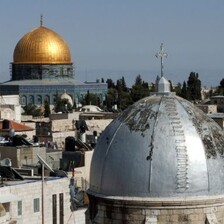
The illustration commissioned by the Campaign for the Right of Entry/Re-entry to the Occupied Palestinian Territory that Al-Quds newspaper refused to publish.
US President George W. Bush landed in Israel yesterday on his first presidential trip to the country. He participated in a press conference in Jerusalem with Israeli Prime Minister Ehud Olmert, what both men termed a “historic” and “monumental” occasion. After listening to both so-called leaders make their opening comments and fielding questions from journalists, the only groundbreaking revelation I could register was that Bush’s naivete, either real or feigned, only served the agenda of one party in the region — Hamas. The radical Islamists at Hamas could not find a better recruiter for their movement if they tried.
My opinion may be extreme, but then again, I live in extreme limbo under Israeli military occupation, shaped by a policy both men continuously refuse to call by its true name — state terror.
My opinion is certainly subjective but I started my day by reading a communique from the real world: a report by the UN Office for the Coordination of Humanitarian Affairs that the background of the issue: on 28 June 2006 the Israeli Air Force bombed the power plant in the Gaza Strip, destroying all six transformers and cutting 43 percent of Gaza’s total power capacity. The report states, “households in the Gaza Strip are now experiencing regular power cuts” and notes that “the irregular [electricity] supply causes additional problems. Running water in Gaza is only available in most households for around eight hours per day. If there is no power when water is available, it cannot be pumped above ground level, reducing the availability of running water to between four and six hours per day.” The result of this single punitive measure, as stated in this report, is that if Gaza’s Coastal Municipalities Water Utility “cannot provide its own emergency power supply because of its own fuel shortages, it has to pump raw sewage into the sea which damages the coastline in Gaza, southern Israel and Egypt.”
In another report, released the same day, the World Food Programme spokesperson Kirstie Campbell finds that 70 percent of the population of Gaza has to choose between putting food on the table or a roof over their heads.
Bush and Olmert do not seem to worry there will be any fallout from the disturbing information in these reports, released one day before Bush’s arrival. As a matter of fact, the reality that Israel has successfully placed 1.5 million Palestinians in the Gaza Strip, over 50 percent of them children, in the dark and under the most draconian siege in recent history did not even make it to the margins of either leader’s speeches.
Much more important issues were on Bush’s agenda. The need to realize and work on a “vision” for the future was in the forefront of Bush’s mind. “The parties” should now sit down and “negotiate a vision” — the parties being Israel, the fourth strongest military might in the world and a forty-year-long occupier, and the Palestinians, a stateless people who have been dispossessed by Israel for sixty years and under brutal military occupation by their colonizers for over four decades.
Both Bush and Olmert did send one united message to the world: the two-state solution was still the aim of the negotiations. Reading between the lines, we can infer that to them, the specter of a single democratic state, from the Mediterranean to the Jordan River, is the most frightening vision of all. To ensure that a one-state solution of Palestinians (Muslims and Christians) and Israelis (Jews, Muslims, and Christians) living side by side with equal national and civil rights in historic Palestine does not materialize, the US and Israel talk about a two-state solution, but in the meantime, the US bankrolls Israel as it continues to create facts on the ground that make any viable Palestinian state impossible.
Olmert was clear beyond a doubt: President Bush has been very, very good for Israel. Olmert was nearly jumping for joy as he praised Bush for increasing the comprehensive US aid package to Israel to a whopping $30 billion.
Journalists constantly raised the issue of Israeli settlement-building in the occupied territory. Again, Olmert said Jerusalem is different, and no one should expect settlements to stop there. As for the other settlements, he said it was complicated and began elucidating the lexicon of “outposts,” “population centers,” etc. Bush, for his part, was only able to remind us all that Israel has been promising for over four years to stop settlements but has yet to do so. Even that came with a chuckle amongst journalists, as if the human tragedy these settlements are causing was a side show. Rarely has Bush given so persuasive an impression of being detached not just from the facts but from any sort of empathy for the victims of this appalling situation.
But mainly, it looks like Bush came to Israel to speak about Iran. Bush seemed very enthused about threatening Iran from Israel. His glaring inability to articulate a basic understanding of the Palestinian-Israeli issue left seasoned Israeli journalists chuckling in disbelief at the president’s replies. The local press corps noted every opportunity seized by Olmert to hitch a ride on each one of Bush’s superficial comments, lauding the importance of the Bush visit, the Bush commitment to peace, and Bush’s courage in confronting the region’s difficulties.
Today Bush arrives in my Israeli-occupied city of al-Bireh/Ramallah. He plans to land two blocks away from my home, in a sports field that I happen to be developing as a commercial project for the nearby Friends (Quaker) School. We were notified today that our street will be one of the many that will be under 100 percent lockdown. We were advised we would be risking our lives if we went to our rooftop to watch the charade unfold. Public notices from the Palestinian police chief warned that absolutely no protests would be tolerated. In short, we were told to stay indoors. Even our local newspaper, Al-Quds, refused to publish as an advertisement a cartoon satirizing Bush’s visit submitted by a civil society campaign I work with. So much for running a business, economic development, and freedom of the press. So much for Palestinian democracy too.
As an American and a Palestinian, if I could advise Palestinian Authority President Mahmoud Abbas on how to greet his American peer today, I would ask him to declare the end of the Palestinian Authority, which Israel has purposefully and systematically destroyed. I would ask him to announce that the Palestinians will not accept Rambo-style diplomacy and will revert to international law as the only reference point for resolving the conflict. I would ask Abbas to request America’s support for nonviolent resistance against sixty years of dispossession and forty years of military occupation by calling for a strategy of boycott, divestment and sanctions against Israel until it joins the community of law-abiding nations.
But that’s not all. If I were Abbas I would tell the world that the Palestinian people will remain committed to the two-state solution until the end of 2008, and after that, if the international community fails yet again to end this nightmare of occupation, the Palestinian people will return to their original strategy of calling for one democratic secular state, where Palestinians and Israelis of all religions can live in dignity and mutual respect as equals — one person, one vote, with appropriate arrangements for cultural autonomy for all.
Sam Bahour is a business consultant and may be reached at sbahour@palnet.com.
Related Links
- George W. Bush: You are not welcome, Mohammed Ali writing from the Gaza Strip (10 January 2008)
- BY TOPIC: Boycott, Divestment and Sanctions





